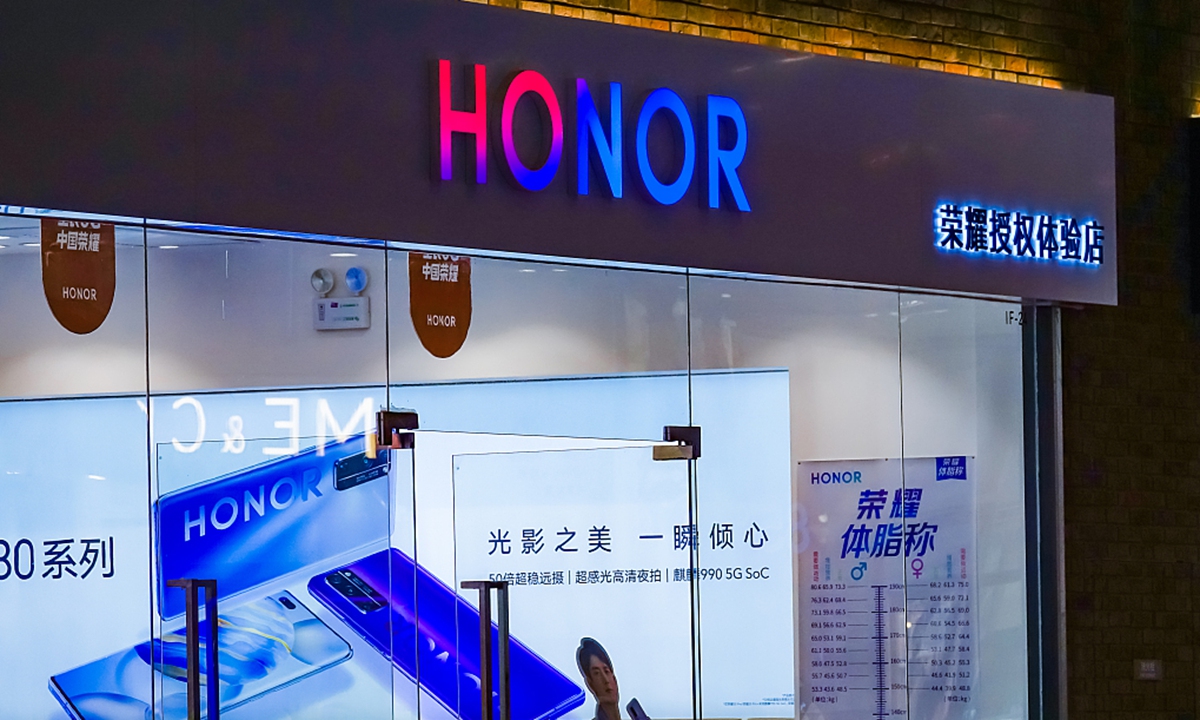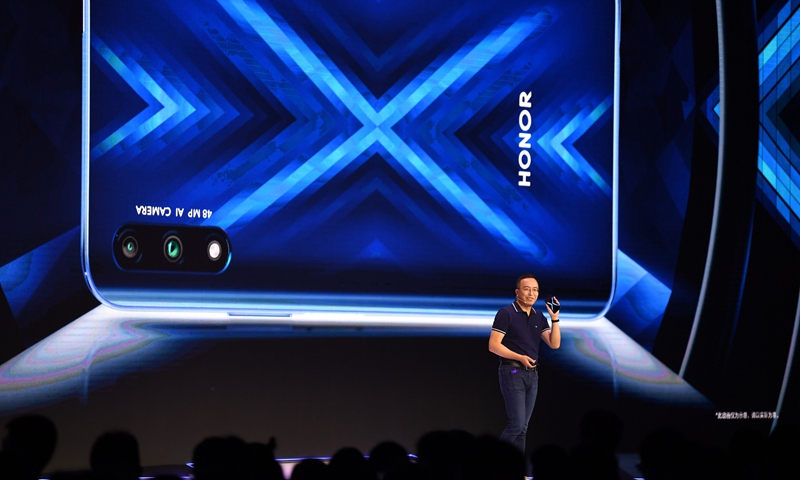SOURCE / MARKETS
Honor sell-off ‘warning bell’ to tech sector amid US political crackdown
One way for others to avoid repeating fate of Huawei subsidiary: increase self-reliance

File photo: VCG
It was a symbolic day when the Chinese tech giant Huawei Technologies – the world’s second-largest smartphone vendor – finally decided to strip off its subsidiary phone brand Honor, which has greatly contributed to the development of Huawei’s consumer business. This difficult decision was interpreted by Chinese industry insiders as intensified warning shot for the whole industry in face of US-initiated tech war.
There is only one way for other tech firms to avoid repeating the fate of Honor: increase self-reliance in core technologies and strengthen supply chain integration, insiders told the Global Times on Tuesday, shortly after Huawei announced the sell-off of its mid-range phone brand Honor to a Chinese consortium of over 30 agents and dealers. The deal is also seen as an “unprecedented, stirring self-rescuing" move of the whole supply chain.
The consortium is led by Shenzhen Zhixin New Information Technology Co, jointly founded by state-owned Shenzhen Smart City Technology Development Group Co, and other Huawei long-term agents and dealers along its industrial chain, including Beijing Songlian Technology Co.
The sale will include all Honor assets, and once the acquisition is complete, Huawei will not hold any shares in the new company. The deal represents "a market-driven investment made to save Honor's industry chain," read a statement from the consortium of buyers issued on Tuesday morning.
Some Huawei employees observed the deal with complex emotions, with one employee saying they were “witnessing history.” No part of the Honor brand, designed to appeal to the tech-savvy young community, will remain in Huawei’s hands, as the sale reportedly includes the brand, research and development (R&D) capabilities, supply chain management and its 8,000 staff who will move to the new entity.
Difficult choice
Market rumors about the sell-off have been circulating for weeks. Market observers have kept a close eye on developments as it is a major step for the Chinese tech giant to take in response to the escalating sanctions imposed by the Trump administration, particularly on chip supply.
“If Honor continues being part of Huawei, given the US government has not eased its sanctions on Huawei, there will be less chipsets available” for this lower-end smartphone brand, given different levels of priority for component supply, Jia Mo, an analyst at market research firm Canalys, told the Global Times on Tuesday.
“This puts Honor at greater risk compared to Huawei, so it had to make the utmost efforts for its survival,” he said.
As part of the blockade instituted by the US targeting Huawei, which has also dealt a heavy blow to the overall Chinese high-tech industry, the US has escalated measures aimed at curbing supplies to the Chinese tech giant. Most recently, September 15 was the date set by the US to limit high-end chipset supplies to Huawei, and it is expected to have a large impact on the company's Kirin chips and high-end flagship smartphones.
Though Huawei had stockpiled a large amount of chipsets and components prior to September 15, industry insiders said the chipset inventory would only meet the demands of Huawei’s Mate and P series – its high-end smartphones – and that the strategy has significantly delayed new product launches under the Honor brand.
The sell-off is also seen as an all-out effort in the supply chain to save a growing domestic brand, which is akin to "cutting off its arm to save its body," according to some analysts.
Huawei said in a statement on Tuesday morning that its "consumer business has been under tremendous pressure." The decision will help Honor's channel sellers and suppliers make it through this difficult time, the Chinese tech giant noted.

Huawei Honor 9X unveiling ceremony in July, 2019 Photo: Xinhua
Future path
Stripping off Honor does not necessarily mean that the new smartphone company will not be a target of US sanctions, particularly when the Trump administration could amount to final madness and hysteria regarding its China policy. Further measures targeting Chinese entities and individuals could still be enacted, some experts said.
“The consortium of buyers also risks being included in the US Entity List, which explains why Huawei made this decision during the transition of power in Washington,” Jia said.
The deal is likely to reshape the domestic smartphone landscape, as the new Honor company is expected to bring stiff competition to other players like Xiaomi, Oppo and Samsung’s low and middle-end products, analysts predicted. Also, as it has now spun-off from Huawei, Honor can immediately buy chips from suppliers like MediaTek, access to Google’s Android services and regain Huawei’s lost market share overseas.
A solution to this problem for Honor may lie in going public. It would be great for the investors now and would make the ownership transparent enough to expel any doubts of the US government, some analysts suggested.
However, the sell-off will have far-reaching repercussions not only on Huawei but also the whole Chinese tech industry, as Washington’s unreasonable yearlong political crackdown on the Chinese high-tech sector has made one thing crystal clear: The only way to maintain sustainable long-term development is based on self-reliance on core technologies.
Hours ahead of the Honor announcement, Huawei senior executive Catherine Chen Lifang, wrote in a public post that Huawei has chosen a difficult path, and there is no route of retreat that would lead directly to victory. “There’s no need to lament on injustice while playing out the mindset of a victim. The only way out is to be strong,” she said.
Amid a contentious transition period for the US government, there is a consensus in China’s high-tech industry that president-elect Joe Biden is unlikely to relax President Trump’s hardline policies on Chinese tech companies.
During the just-concluded fifth plenary session of the 19th Central Committee of the Communist Party of China, the country’s highest decision-making body, top Party officials elevated the role of the domestic market and homegrown technologies in China's social and economic development, with emphasis on self-reliance in core technologies.
“This could be an intensified warning shot to other companies around the world, as Honor today could be their predecessor if the US political crackdown continues… and who will be next?” Ma Jihua, an industry expert and a close follower of Huawei, told the Global Times.


